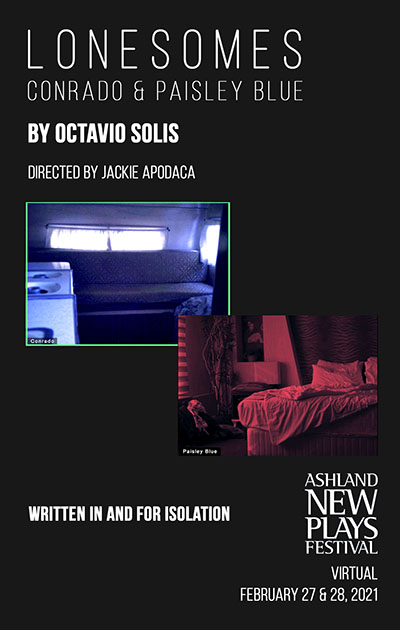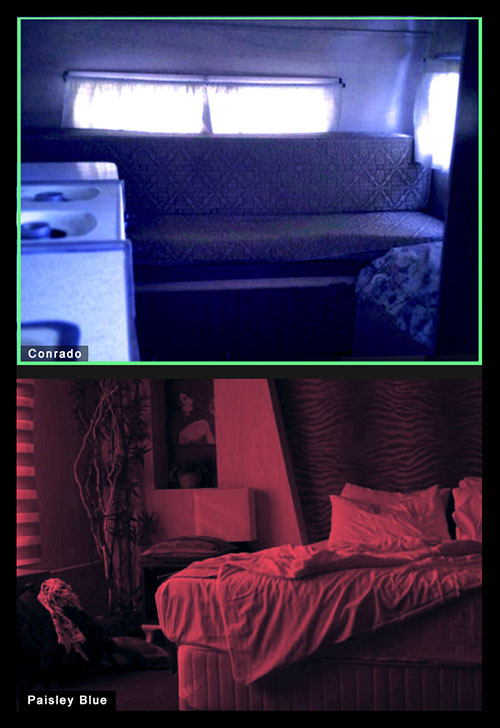Lonesomes: Conrado and Paisley Blue (Ashland, Oregon)
Carla Della Gatta, Florida State University | March 17, 2021
“Lonesomes: Conrado and Paisley Blue” by Octavio Solis
Ashland New Plays Festival, virtual live event, February 27-28, 2021
Directed by Jackie Apodaca. Starring Armando Durán and Isabel Pask.

Lonesomes takes on a genre that became popular over the last decade and proved a necessity over the last year: self-cinematography with curated backdrops for personal, and here intimate, conversations. Billed as “two new pieces written in isolation,” the performance begins with Conrado peering through the camera into his computer at an empty room on the other side of the online chat. The room is filled with sparse décor, a large bed, and various sex toys spread across. The sign at the top of the screen makes clear that this is the porn chat room of Paisley Blue for “Adult Hub Live!” who Conrado reveals is his estranged daughter. Nobody appears for the duration of his lengthy monologue, and he is unsure if his daughter can see and hear him or where she is located geographically; she had gone missing years ago, and he ran across her chat room while using the pornography site. Almost as accidentally deliberate, the theatre audience is also present but absent, watching this live performance from various unseen and undetermined locales, a palimpsest of voyeurism to keep us from feeling lonely.
The crux of the father-daughter estrangement becomes steadily revealed; Conrado and his wife were in an accident, and she suffered internal injuries that eventually led to her death. His seeming insensitivity, relayed through laughter and jokes, were a coping mechanism that his daughter Jessie could not accept. Much like the visual and verbal cues that are misinterpreted over mediatized communication, Solis reminds us that relationships get broken in-person too; for all of the live contact that everyone has missed over the last year, the trigger moment for Lonesomes is not a grand reunion but a life-changing rupture.

Solis instead offers resolution, with all of its discomfort and complexity. Conrado finishes his monologue, and as soon as he walks away, the audience catches a glimpse of Jessie’s leg, suggesting she has heard and seen him. After an intermission, a slide reads, “Six Days Later,” and Paisley Blue appears in her bedroom as Conrado lays head-in-arms across his table, passed out from alcohol, for the duration of her monologue. Paisley Blue is the online avatar of his daughter Jessie, and she first appears in a black and blue wig, fake eyelashes, and heavy makeup. As she details her events of the last few years, she removes her online persona through makeup and costume. With the closing and opening of her cardigan sweater, she loosens it when she can display confidence and conversely, wraps it around herself as a shield for guarding her emotions. Jessie and Paisley are each performed by and for certain lenses; Jessie tells her father of the emotional trauma he has caused by overlapping their visual and emotional spaces. Jessie divulges to her father that her customers need Paisley Blue as much as Paisley needs them; for both, it is a desire to be seen through the eyes of love.

Paisley’s monologue and Pask’s performance showcase a range of subtlety and nuance. Through beaming eyes and excited breath, she talks of the surprise of a genuine connection that developed with someone through her chat room, an awakening of her own romantic and sexual desire and the subsequent pain of a broken heart. Jessie’s emotional journey weaves through justification exuded as confidence, and the genuine loss of her adolescence. Pask fluctuates between her duo-character of Jessie and Paisley through shifting the positionality of the camera and her body. Corporeally, this is actualized through a piece of red lipstick lingering on her upper lip and tears streaming down the side of cheek, illuminating the chipped mask of the avatar barely covering the naked emotion of the now sexually-experienced little girl.
Conrado’s Mexican heritage, made implicit in the play through cultural references and through his slips into Spanish phrases and endearments when speaking to Jessie, illuminate the linguistic distance between them; her lack of Spanish and noticeable southern U.S. accent make them as disconnected sonically as they are visually and geographically. Throughout the visual voyeurism, the monologues are performed in the auditory silence of isolation, interrupted only by a car horn on a New York City street outside Pask’s window and Conrado’s listening to the wind “that reminds [him] of Agustín Lara”. Lonesomes has the subject matter of isolation, but through the two-part monologues, separate screens, distinct geographies, and aural differences, Solis creates a form and sound of isolation as well. The rhythm that is a hallmark of Solis’s writing remains, a confessional tale in poetry for and of the pandemic.
Images courtesy of Pars Sahin and nuclearmcgyver.
